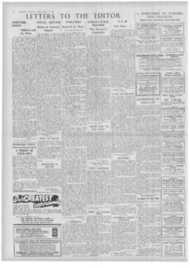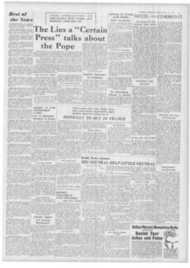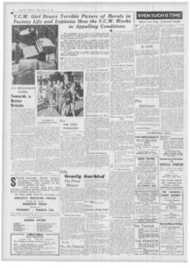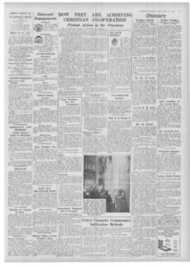Page 5, 14th March 1941
Page 5

Report an error
Noticed an error on this page?If you've noticed an error in this article please click here to report it.
Tags
Share
Related articles
Irish News Letter
Liverpool Alderman On Eire's Neutrality
Irish Neutrality
Irish. News Letter
Neutrality Isn't Hostility
Irish %PTA'S Leifer
BIG NEUTRAL HELP LITTLE NEUTRAL
Front our own Correspondent
DUMAN.
" We don't want to fight, But by Moses if we do,
We've got the men but not the guns—"
After the wild guesses about Mr. de Valera's talk with Mr. Willkie, an inkling of what really was discussed may be gathered from the departure of Mr. Frank Aiken to America, flying via England, Lisbon and the Azores, to seek supplies and munitions for Ireland.
Mr. Aiken, who is Minister for Coordination of Defence Measures (and all our revival of Irish has not taught civil servants to devise less cumbrous titles), is regarded as the strong man of the Irish Government. Silent to moroseness, except when he startles the Dill by impatiently telling it that we could thrive " if every damn ship was at the bottom of the sea," he is exceedingly popular among the soldiers, and the Irish in America will give him a warm welcome.
He carries a letter to Mrs. Roosevelt from Mrs. Gray, wife of the American Minister in Ireland.
Some ante ago I told the story of Ins audience with Pope Pais XI, when the fare Holy Father was so delighted at Mr. Aiken wishing to see the Vatican farm instead of pictures and manuscripts, that His Holiness spent half an hour talking about Kerry cattle and dairy-farming, and Mr. Aitken drew a sketch on the Pope's writing-pad of the famous Kerry breed that he keeps on his mountain farm in S. County Dublin.
ARMS AND MORE ARMS Mr. Aiken's present mission is one of considerable urgency Ireland wants arms and more arms Its young men are trained to a hair for battle, if that dread ordeal must come, but our cities arc not equipped with anti-aircraft weapons in anything like adequate degree to endure aerial attack England, naturally, cannot Sparc our neutral territory defensive weapons that she needs for herself ; so our only chance to be equipped properly, before the trial, is to get the needed weapons from America.
Supplies in general are equally important, if we are spared actual warfare. Chief of our immediate needs is petrol; for the stocks in the country are allocated to defence, and with no more at present arriving, virtually all civil motoring has ceased. This has stricken many industries and has driven thousands of men into unemployment.
We arc, in a way, blockaded more thoroughly than if we were at war. The Germans are sinking vessels bound for Ireland—their blockade of half the map makes no exception, effectually, of our little neutral area. Britain does not blockade us, of course, but she has taken the attitude, since the sea war was intensified. that if we are neutral it is no part of her business to keep us supplied. Our only claim on the supplies of goods reaching England from overseas is a meagre allocation in payment of our food exports to her: that, and some good-will which we appreciate but cannot build upon, in such times.
MR. AiKEN LAYS 111E FACTS DOWN
So Mr. Aiken has to lay these facts before American powers that be, urging that a big neutral should help a little neutral, and, in fine, that America should sell us arms, petrol, timber and pulp, perhaps also some grain, and should facilitate us in buying enough ships to enable us to run the blockade under our own flag. How far he will succeed, cannot be versed, although we assume that his flight to America follows a message from that country of encouragement, after Mr. Willkie had explained Ireland's case to the President.
I think that Englishmen will wish well to the appeal ; for they will appreciate that Ireland needs arms badly, if she is to endure the trial that she must go through, even as neutral. If war is forced upon us, the degree of our success in defence will be measured by the degree of our preparation, and Englishmen certainly must wish us to be as fully prepared as the circumstances allow SUMMON THE YOUNG TO CHARITY I The Archbishop of Dublin follows his beloved predecessor, whose dearest charity was that of St. Vincent de Paul, Dr. MacQuaid presided at a meeting of the Society in the Dublin Mansion House, and recommended the recruiting of youthful members.
" There is a vast force of unselfish generosity in young hearts that awaits a welcorning gesture and a guiding hand," said the Archbishop. " To you the merit if your Society can, secure for our Divine Master's loving service this almost limitless assistance of our youth.'' The Archbishop said that, if coming years showed an increase of young members, there would be reason to feel that past students of secondary schools had awakened to a keener sense of their social responsibility and to the need to co-operate more generously with their parish clergy IRISH BISHOP'S PASTORAL CENSORED Who would be a Censor? The difficulties of Irish censorship were illustrated in the Dail when Mr. James Dillon asked whether the Censor had ordered the deletion of any part of the text to be published in the Press, or through the cinema in Eire, of: (I) Any pronouncement of Pope Pius XII; (2) any semi-official Vatican statement published originally in the Osservatore Romano; (3) Lenten Pastoral of any bishop in Eire, and, if so, why?
Mr. Oscar Traynor, Minister for Defence, in reply, said that no deletion was made from any pronouncement of His Holiness Pope Pius XII. Portion of a statement quoted by the Associated Press as having appeared in the Osservarore Romano was deleted. This particular portion was deleted
because it referred by way of retutation to certain belligerent propaganda suggesting certain sympathies on the part of the Holy Father which, in fact, had not been allowed to be published here.
A portion of the text of the recent Lenten Pastoral of one bishop was deleted, on the grounds that its publication in the Press would have been a contravention of a general direction given in pursuance of the Emergency Powers (No, 5) Order, 1939.
IRELAND'S MUSICIAN.
The C.Y.M.S. of Belfast organises a patriotic function every year. It chose this year to give a Hardebeck Concert: that is, a night devoted to the life-work of Carl Hardebeck, collector, editor and composer of Irish music. Dr. Hardebeck was born in London 72 years ago, went to Belfast in his early manhood, and devoted nearly 50 years to the cultivation of Ireland's musical heritage. He now lives in Dublin, blind since youth and now frail in health; and the Catholic society organised the concert as a tribute to him.
Now, when a specific Catholic society undertakes a good work in Belfast, other societies co-operate—the Irish organisations which work for Irish games and the Irish language throw themselves equally into the event. The Bishop of Down and Connor presided, and spoke at the beginning of a broadcast made, via Athlone, from Belfast to all Ireland, That noted orator of the North, Rev. Dr. A. H. Ryan, spoke on Ilardebeck's work, and Padraic Gregory, the poet, read an ode in Harclebeck's honour. Harpers came from a great convent school in Lisburn. Beginning with the Bishop's blessing on the undertaking, the event was, in effect, a total effort by the Catholic people.
blog comments powered by Disqus









